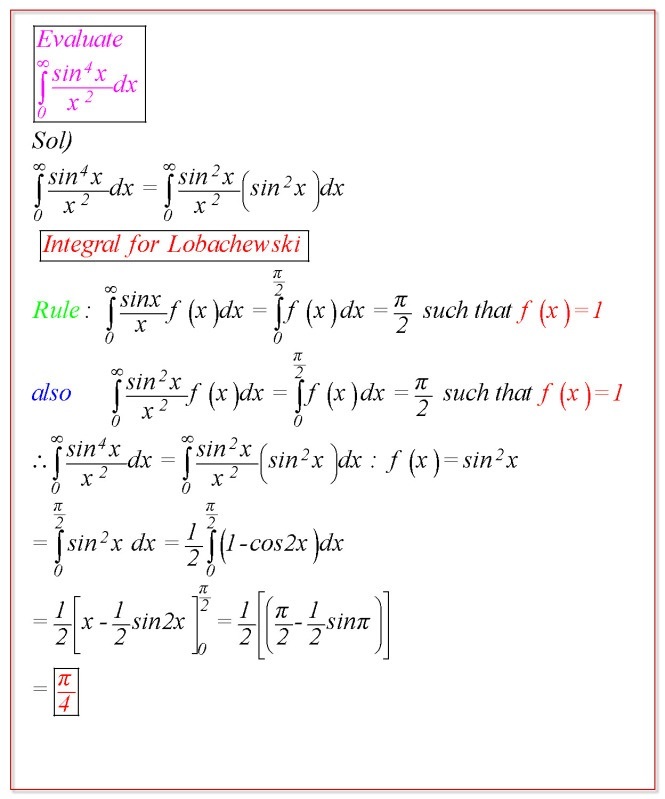This section requires Javascript.
You are seeing this because something didn't load right. We suggest you, (a) try
refreshing the page, (b) enabling javascript if it is disabled on your browser and,
finally, (c)
loading the
non-javascript version of this page
. We're sorry about the hassle.
2 solutions
I = ∫ 0 ∞ x 2 sin 4 x d x = ∫ 0 ∞ 8 x 2 cos 4 x − 4 cos 2 x + 3 d x = 8 1 ∫ 0 ∞ x 2 cos 4 x d x − 2 1 ∫ 0 ∞ x 2 cos 2 x d x + 8 3 ∫ 0 ∞ x 2 1 d x = − 8 x cos 4 x ∣ ∣ ∣ ∣ 0 ∞ − 2 1 ∫ 0 ∞ x sin 4 x d x + 2 x cos 2 x ∣ ∣ ∣ ∣ 0 ∞ + ∫ 0 ∞ x sin 2 x d x − 8 x 3 ∣ ∣ ∣ ∣ 0 ∞ = − 8 x cos 4 x − 4 cos 2 x + 3 ∣ ∣ ∣ ∣ 0 ∞ − 2 1 Si ( ∞ ) + Si ( ∞ ) = − x sin 4 x ∣ ∣ ∣ ∣ 0 ∞ + 4 π = x → 0 lim x sin x ⋅ sin 3 x − x → ∞ lim x sin 4 x + 4 π = 0 − 0 + 4 π ≈ 0 . 7 8 5 See note: sin 4 x = 8 cos 4 x − 4 cos 2 x + 3 By integration by parts where Si ( x ) = ∫ 0 x t sin t d t is the sine integral. See note: sin 4 x = 8 cos 4 x − 4 cos 2 x + 3 Note that Si ( ∞ ) = 2 π
Note:
sin 4 x = 4 ( 1 − cos 2 x ) 2 = 4 1 − 2 cos 2 x + cos 2 2 x = 4 1 − 2 cos 2 x + 2 1 ( 1 + cos 4 x ) = 8 cos 4 x − 4 cos 2 x + 3
thanks sir Chew-Seong Cheong
 thanks sir Chew-Seong Cheong
thanks sir Chew-Seong Cheong